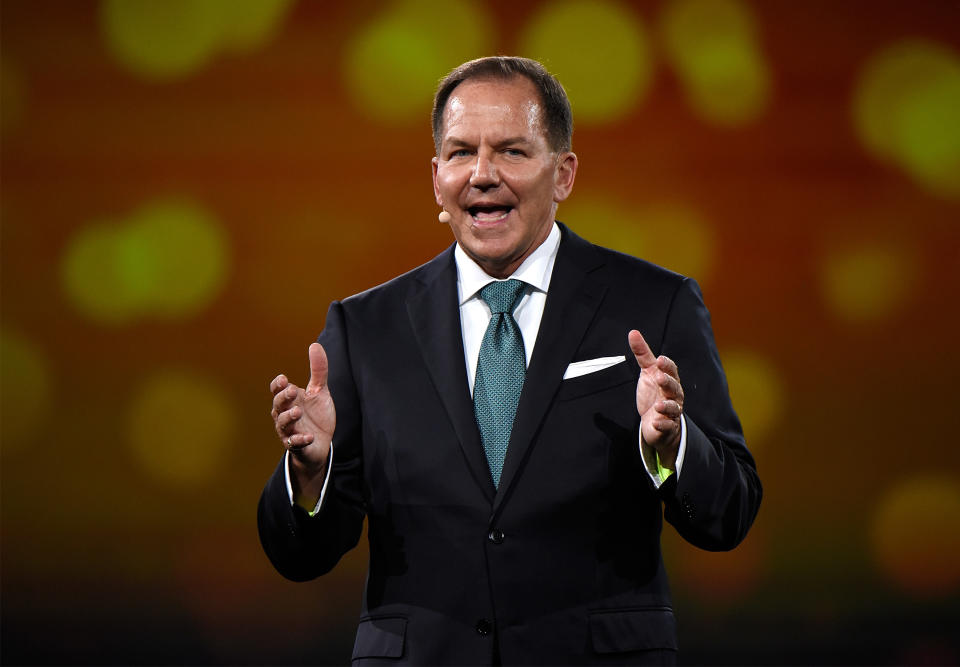Paul Tudor Jones hits public companies for lack of living wages: A 'tax on society'
Billionaire hedge fund manager Paul Tudor Jones called for public companies to pay their employees a sustainable wage, calling the pay shortfall a "tax on the rest of society."
Speaking at the Greenwich Economic Forum earlier this week, Jones said that "fixing capitalism is so easy" — and it can begin with companies taking care of their employees financially.
"We're never going to fix the social problems that address us today if we do not start in the workplace," Jones said. "The easiest place to start is we have 6 million employees of public companies that today do not make a living wage [and] lives under the poverty line."
Jones joined fellow hedge fund billionaire Ray Dalio, the co-CIO of Bridgewater Associates — the world's largest and most successful hedge fund — in a fireside chat. Dalio has also been vocal about the need to reform capitalism.
"Capitalists' capital stays where they like capitalism,” Dalio told the forum.
“And capitalism needs to be fixed, and if you don't fix it, you're going to have a revolution, and then you're also going to chase the capitalists away," the billionaire added.
‘Solving for the perfect society’

In response, Jones outlined how a more significant percentage of corporate profits have gone mostly to the shareholder class — one of the major critiques of President Donald Trump’s signature tax reform.
"There's $2 trillion of corporate profits. Fifty years ago, a trillion of that would have gone to employees, the 90 million American workers," Jones said. He added that those profits would also benefit communities, the environment, and customers.
"Now it goes to, increasingly the one-percent," Jones added.
He explained that this was a "natural, unchecked movement" because the broader culture internalized the notion that "business is where you make your money, and that's all you do."
Jones also added that nearly half of a person's waking time is spent at work, when they're not eating, recreating, or commuting.
This emphasis on work stems from the idea set forth by Milton Friedman that the purpose of business is to maximize profits.
Combine that mentality with Gordon Gekko, the infamous character from the film “Wall Street” who espoused a "greed is good" ethos, and the outcome has helped contribute to a societal breakdown.
"Greed got us the opioid crisis that killed nearly a million Americans. Greed's got us wealth disparity that's five-times where it was 50 years ago. Greed has created the greatest divisiveness," Jones said.
In 2013, Jones, along with a handful of others, created JUST Capital, a non-profit with a mission of promoting economic justice.
"Hopefully, culturally, hopefully, organically, we can make everyone think whether I'm a shareholder or I sit on the board: 'I have an employee that's not making a living wage yet we are paying ourselves dividends, we are engaging in share buybacks, etcetera, is that really the American way? Is that fair?” the investor asked, rhetorically.
“Shouldn't I first be thinking about that group of stakeholders that are so critical? And just remember those 6 million employees not making a living wage are being subsidized by all of us in this room, so it's actually a tax on the rest of society to have a worker that works for your company that doesn't make a living wage,” Jones added.
He also noted fifty years when shareholder profits were at 6.5%, versus the 13% today, that gross domestic product was double.
"If we are solving for the perfect society, what level of profits and compensation do we need to have to encourage....the entrepreneurs of the world to go create businesses. Does it have to be where it is right now with this enormous striation between the least paid and the highest paid?" Jones asked.
Julia La Roche is a Correspondent at Yahoo Finance. Follow her on Twitter.
Read the latest financial and business news from Yahoo Finance
Follow Yahoo Finance on Twitter, Facebook, Instagram, Flipboard, SmartNews, LinkedIn, YouTube, and reddit.

